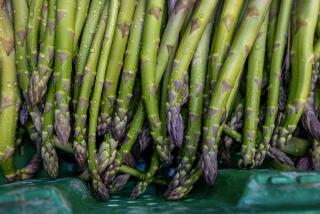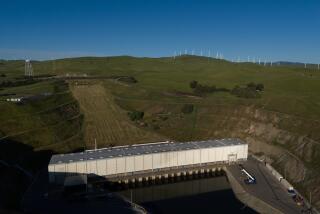Catfish Growers Worry They’ll Go Belly Up With Current Oversupply
- Share via
GREENWOOD, Miss. — It is a few hours before dawn, and Bardin Redditt is driving his dusty sedan slowly along the levee, pausing to shine a spotlight onto the muddy waters of his ponds, praying that he does not see a thousand catfish belly up and dead.
The catfish industry, once hailed as salvation for the rural economies of the South, is in deep, deep trouble, a victim of capitalism run amok and of a vicious cycle of supply and demand, brought on in part by the industry’s youthful exuberance and what one grower calls “our own stupidity.”
The economies of large regions of Arkansas, Louisiana, Texas, Alabama and Mississippi have become intertwined with the growing and killing of catfish. While the new enterprise has experienced boom and bust, nothing compares with the current crash in the $450-million annual industry.
“I’ve never seen things this bad,” Redditt said. “The fish farmer is just like the damn fish. He’s just laying here gasping for air, trying to stay alive.”
Redditt and hundreds of catfish growers and their panicky bankers said their entire industry is in danger of going belly up.
One banker in the Mississippi Delta estimated that half of the state’s 300 growers are in trouble and that about as many as one-third could go bankrupt. A few fish farmers have surrendered to bankruptcy. Rumors of foreclosures abound.
Strapped for cash, with no money to buy catfish chow, some growers are feeding their fish half-rations. Others are letting the fish starve.
Because of record-low prices, Redditt is keeping his fish, so his ponds this summer are teeming. Such abundant life, such breathing and metabolizing can deplete oxygen in hours, killing an entire pond in minutes, depriving Redditt of $50,000 in the time it takes to drink a cup of coffee and swat a few mosquitoes.
“Catfish is a Cinderella story,” Redditt said. “Catfish were going to save us all. Well, now, I ain’t so sure.”
Since the early 1980s, the industry has experienced phenomenal growth, turning catfish into the fifth leading agricultural crop in Mississippi, luring cotton farmers such as Redditt, who converted almost 200 acres of his land into ponds. Each year, production and consumption have increased.
With easy credit and government loans, the number of farmers, ponds and processing plants tripled. Legislators hustled for government grants to start catfish-processing plants, which provided jobs in counties where there was little to do other than leave or collect unemployment.
Here in the Delta, which produces about two-thirds of the nation’s catfish, the industry has transformed the landscape, dotting the countryside with 100,000 acres of ponds, bringing jobs and prosperity to many counties that were drying up and blowing away.
Not only has the industry provided for growers, but companies and workers are digging ponds and wells, laying pipe, fixing levees, seining fish and hauling them to processing plants. There are tractors to sell, generators, aerators and agitators. There are consultants, insurers, bankers and fish veterinarians.
Catfish are selling for about 60 cents a pound, but producing a pound of catfish costs about 65 cents. It is very expensive to dig ponds, stock them with fingerlings and feed the fish every day, and many farmers are leveraged to the hilt. Credit, however, is scarce, and new start-ups have stopped. Everyone is retrenching or holding off increasingly nervous lenders.
“Five years ago, I had several people a week in here, asking about how to get into catfish. Now, nobody,” said Jerry Gillespie, president of Guaranty Agricultural Credit Corp. in nearby Belzoni, which has invested heavily in catfish. “We’re not making any more loans.”
To understand the crash of the catfish industry, one must understand the growers. “These aren’t fishermen growing fish,” said Hugh Warren, executive director of Catfish Farmers of America. “These are farmers growing fish. There’s a world of difference.”
Bill Allen Jr., president of the Catfish Institute, called the growers “gamblers, risk-takers” who will “throw the dice.” Allen also is executive director of the Catfish Bargaining Assn., a kind of catfish cartel that fell apart when prices plummeted.
Some growers have made and lost fortunes. Many more are millionaires on paper. Redditt has an airplane, good land, cotton in the fields and 17 ponds full of catfish. But, in 12 years of growing catfish, he said, he probably has done no better than break even.
As Allen said, “It’s a good business, if only we can figure out how to make money at it.”
The current trouble is largely the industry’s fault. As with few other commodities, growers control the entire industry. They own the feed mills, the land, the ponds and the catfish. And growers often own the processing plants that kill, fillet, package and market the fish.
While this gives the growers tremendous independence, it also has doomed them to cycles of boom and bust.
“The system is crazy,” Gillespie said. “It’s got to change.” Either the growers will change it, he suggested, or the market will take care of them.
When growers receive a lot of money for their fish, as they did in the mid-1980s, processing plants operate at a loss. When the processors get the fish cheap, as now, growers lose money.
However, in the world of catfish, growers and processing-plant owners often are the same men.
“In reality, they’re losing money even when they’re making money,” Gillespie said. “They’re cutting their own throats.”
Even Redditt admitted, “We’ve done it to ourselves.” He is a shareholder in a farmer-owned feed mill and in Delta Pride, a farmer-owned processing plant that is Mississippi’s largest.
Whether the industry will remain in farmers’ hands is uncertain. Many analysts in the Delta insist that growers must learn to control production, but the farmers have failed.
Attempts to bargain collectively have fallen apart. For a while, many growers agreed to sell at prices set by the Catfish Bargaining Assn., which tried to keep prices high.
But when so many farmers produced so many fish, the dam burst, and panic selling began. In the face of oversupply, prices have been in free fall for months.
What is in store for catfish, salvation of the Mississippi Delta?
“We’re at a crossroads,” Allen said.
Some lenders and agricultural economists said they believe that the industry could become like the poultry business, controlled by a few large companies that tightly control supply.
In the poultry business, growers simply baby-sit chickens, raising them and selling them to large companies. The growers make money but not a killing. Compared to the wild ride of the catfish industry, it is a dull but stable business.






